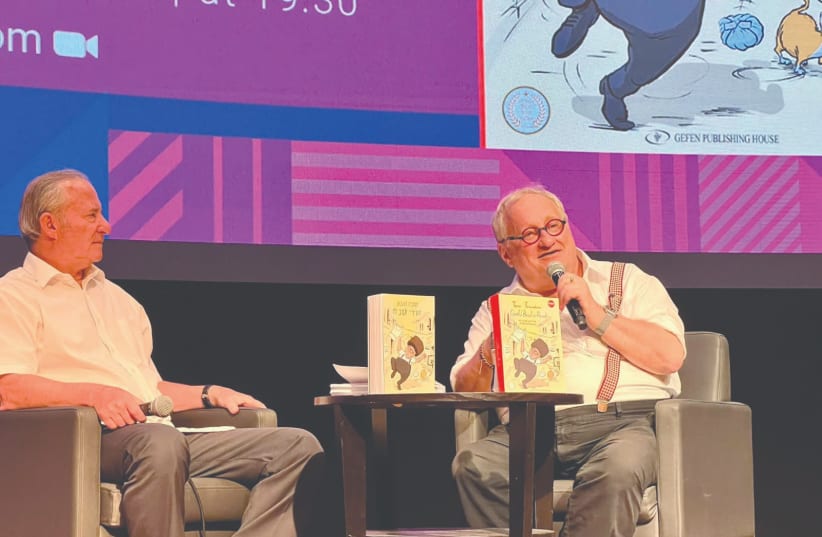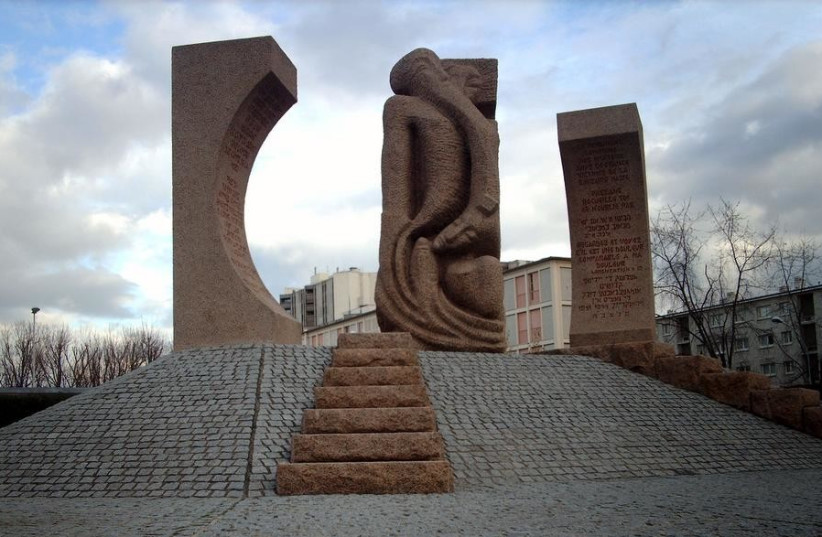Considering the number of organizations and institutions that care for Holocaust survivors, one would imagine that there is no need to do more for them socially or financially. But despite their dwindling numbers, there are still Holocaust survivors who do not receive the services that are purportedly provided for them. Many live alone in impoverished circumstances, sometimes having to decide whether to spend the little money they have on food or on medications.
Several years ago, social entrepreneur Jay Shultz, who is the founder of several social and cultural organizations in Tel Aviv, founded Adopt-A-Safta, whereby young men and women volunteer to visit Holocaust survivors, sit and talk to them, walk with them, and help them with their shopping. This has been a mutually rewarding experience, but with all its good points, there are still Holocaust survivors who spend Sabbaths and other holy days alone. Some have no close relatives or no relatives at all, while others don’t live close to relatives and are hesitant to bother them. Shultz again put out a call for volunteers for Adopt-A-Safta, but there are also male Holocaust survivors in need of TLC.
■ SEVERAL EMBASSIES hold events on or near Holocaust Remembrance Day. Some of these events are held at Yad Vashem, or in public auditoria, and some in embassies.
The Czech Embassy in Tel Aviv has chosen to combine such an event with a book launch at the embassy on Friday, May 3. The program will include a lecture by Bruce Mainzer on “Fleeing the Nazis: A Journey of Two Sisters and the Hero Who Outwitted the Gestapo.” His lecture describes the escape of his mother and aunt from Nazi-occupied Prague in 1939, thanks to Harry Roth’s strategy that allowed thousands of Jews to escape.
Afterwards, there will be the book launch of Hana Sternlicht’s book, The Girl from Terezín, in which the author tells the story of 12-year-old Hana, who was deported to the Terezin Ghetto and later to concentration camps in Eastern Europe. The story is based on true events and offers a glimpse of the extreme conditions under which she managed to survive.
Organizers of the event believe that it offers an opportunity to gain a deeper understanding of the historical events associated with the Holocaust.
Human rights defenders converge
■ ON MAY 15, leading dissidents and activists on behalf of human rights violations from Cuba, Iran, Venezuela, Nicaragua, Vietnam, Belarus, Zimbabwe, and Bolivia will converge on Switzerland to take part in the 16th Annual Geneva Summit for Human Rights and Democracy.
The published list of speakers does not include anyone from Israel or elsewhere in the Middle East, though there may be representatives from the region who are not among the keynote speakers.
Some of those who are keynote speakers include Lisa Yasko, member of Ukrainian Parliament and founder of the NGO Yellow Blue Strategy; Victor Navarro, exiled Venezuelan journalist, former political prisoner, and creator of the VR experience Helicoide; and Dr. Kylie Moore-Gilbert, British-Australian academic who survived 804 days as a diplomatic hostage in Iran’s Evin prison.
Hosted by a coalition of 25 human rights organizations, the summit will showcase the voices of some of the world’s most courageous human rights defenders.
Among the organizations are two with Holocaust connections: The Lantos Foundation for Human Rights and The Raoul Wallenberg Center for Human Rights.
■ THERE IS so much conflicting information about what is happening in the region in terms of hostage negotiations, where the war is going, and if and when the end is in sight that the public needs an expert to set things straight.One of the experts in this respect is Dr. Mordechai Kedar, a scholar of Arab culture and a well-known advocate for Israel in international forums.
Kedar, who is a lecturer at Bar-Ilan University, has a unique understanding of how Middle Eastern countries operate. He will be speaking on “Israel, Islam, and the Middle East – Is there any hope for peace?” at a breakfast meeting of the Israel Britain and the Commonwealth Association on Thursday, May 9, at the Daniel Hotel in Herzliya. His version, he explains, is not that of the versions of Britain, France, Belgium, and the Netherlands.
His exceptional understanding of the neighborhood in which we live extends to the reality of an Iran whose capabilities and malevolent intentions are far-reaching.
Moreover, whereas one can’t ask questions of newspaper, radio, and television reports, one can do so of someone standing in the flesh only a meter or two away.
The cost for participation is NIS 170 for members and NIS 185 for non-members.
■ ONCE A haredi, always a haredi. An example is best-selling author Tuvia Tenenbom, who last week was at the Begin Heritage Center for the launch of his latest book, Careful, Beauties Ahead!
Tenenbom likes to give provocative titles to his books. The titles appear to have little relationship to the content unless one delves deeply and is familiar with Jewish philosophy.
Tenenbom was born and raised in ultra-Orthodox society.
As he told his audience, he eats kosher and non-kosher. The book is based on a period that he spent in Mea She’arim observing and mingling with the diverse ultra-religious community.
The topic of the book had been suggested by his German publisher, who urged him to go and explore his roots and to discern what may have changed – if at all.
Other people warned him that he would be stoned and cursed – but that didn’t happen, he told Steve Linde, the editor-in-chief of The Jerusalem Report and former editor-in-chief of The Jerusalem Post, who interviewed him on stage.
Tenenbom was pleasantly surprised when residents of Mea She’arim recognized him and stopped him in the street to discuss his books quoting chapter and verse just as they do when quoting the Talmud.
Tenenbom, who speaks a beautiful Yiddish, repeated bits and pieces of conversations in which he had engaged and translated them perfectly into English.
To be honest they sounded better in Yiddish.
Although no longer religiously observant, he remembers what he learned in his youth and it helped that he could refer to religious sources in his conversations
In his interview with Linde, he frequently mentioned how wonderful and amazing he found the people of Mea She’arim to be and praised the gefilte fish of the wife of the leader of the allegedly virulent anti-Zionist head of the Eda Haredit as being the best in the world.
In his conversations with members of the Eda Haredit, Tenenbom told them that they were the true Zionists because they had been there since before the establishment of the state, and many of them are multi-generation Jerusalemites.
While not relishing the idea of being called Zionists, it was something they hadn’t thought about before, and they were more amused than angry.
During his stay in Mea She’arim, Tenenbom did not encounter any of the negatives he had been cautioned he would confront.
It therefore angers him that haredim are constantly being maligned and unjustly accused of acts and attitudes they did not initiate.
When a member of the audience raised the issue of the elephant in the room, – namely the battle for the preservation of the status quo whereby haredi young men can avoid army service, Tenenbom blustered angrily, saying that the haredim are always blamed for a system created by secular politicians. He, himself had served in the IDF, and unlike the many haredim who today use bicycles to get around, the first thing he drove was a tank.Asked whether his background had aided him in his connections with people in Mea She’arim, Tenenbom said no one should write about a community without being familiar with its culture, its history, and its language.He has also interviewed Palestinians, and before doing so, studied Arabic, Palestinian history, and the Islamic religion. When he spoke to Palestinians in Arabic and was respectful of their religious practices, he got along with them easily and well and was invited to their homes, where he ate Palestinian cuisine, which he found to be very tasty.
Just as he was surprised to learn that so many people in Mea She’arim read his books, Tenenbom was also surprised by the size of the turnout for the book launch. He hadn’t expected it, he confessed.Usually at book launches, the speeches and conversations come first, and afterwards, the author signs and sells copies of the book. This time, there was already a long line of eager book-lovers making a purchase long before the event began, and another long line after it ended.
■ SOCIAL ACTIVIST, academic, and philanthropist Iranian-born Dr. Sharon Nazarian, board member of the Anti-Defamation League and a noted expert on global antisemitism and its impact on democratic values and institutions, has been named the inaugural Gahl Hodges Burt Fellow in Policy for the Class of Spring 2024 by The American Academy in Berlin. She is the first recipient of this prestigious fellowship, named in honor of Gahl Burt, former White House social secretary to president Ronald Reagan and his wife, Nancy, and a trustee of the academy since its founding in 1994 by then-US ambassador to Germany Richard C. Holbrooke.
The fellowship was designed to bring outstanding individuals from the policy world in the United States to Berlin each year for several weeks to advance the bilateral conversation between the United States and Germany. Nazarian’s focus on antisemitism will highlight the importance of studying and communicating about the intersection between antisemitism and broader democratic decline in the West.
The daughter of the late Younes and Soraya Nazarian, who were large-scale donors to numerous Jewish causes including several in Israel, Sharon Nazarian travels the world to create awareness of antisemitism and to what it can lead. greerfc@gmail.com

